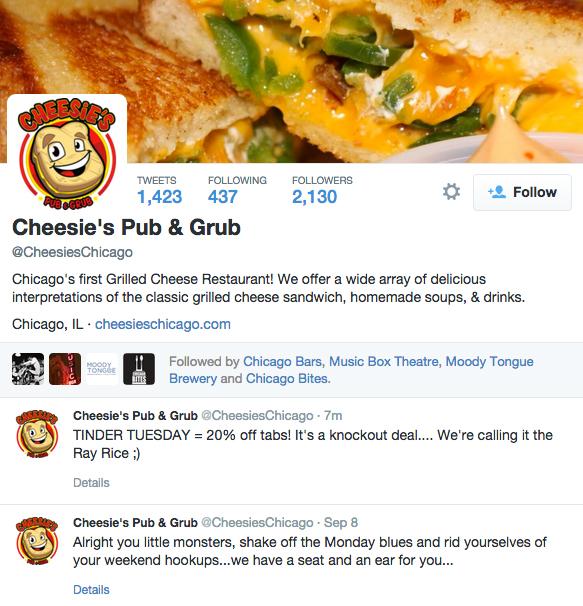Cheesie's The Latest Company To Have A Twitter Fail
By Staff in News on Sep 10, 2014 2:00PM
The Internet has a mind like an elephant and never forgets anything, even if you feel you’ve deleted something and scrubbed the scene clean. Popular grilled cheese sandwich monger Cheesie’s Pub & Grub reaped a whirlwind Tuesday afternoon after this (now deleted) update was posted to their Twitter feed.
Because it’s always OK to be cheeky with a national story involving domestic abuse, apparently. Cheesie’s promptly did what other companies large and small do when faced with a backlash from a social media blunder—they deleted the tweet, apologized, blamed the offending tweet on “a disgruntled ex-employee” and offered to host a fundraiser in the future. (It’s worth noting that Cheesie’s is still calling their daily special “Tinder Tuesday.”)
But the damage had already been done. In addition to the backlash, Cheesie’s also has some publicity, intended or not (a subject discussed at length here at the Chicagoist offices). If the tweet was sent by “a disgruntled ex-employee,” as Cheesie’s claimed, why didn’t management change the passwords to the account? Most damning, why is Cheesie’s not placing their social media accounts into the hands of someone they can trust?
- Don’t give the password to someone with little accountability. That means not hiring your friend just because they have 500 twitter followers. Hire a reputable media agency instead.
- Utilize Twitter’s security tools. Sadly Twitter doesn’t offer as many as Facebook or Google, which can alert you when others are logged into your account. But they do offer two-factor authentication. It can be a pain (you have to approve every log in using your phone), but it’s worth it.
- If there is a security breach on your account, don’t just complain on Twitter. File a police report and report it to Twitter.
- Making jokes about current controversial events is almost never a good way to promote your totally unrelated business. It’s not worth it.
- Don't forget to lock down apps that have access to Twitter if an employee who had access to it leaves. That includes third-party applications like Tweetdeck and Buffer.
- Set a reminder on your personal calendar to change your password every six months.
There are too many examples of business playing fast and loose with social media in this day and age to be flippant or cavalier about something as serious as domestic violence. Or suggesting making whole-grain cranberry scones after the Boston Marathon bombing. Or tweeting pornographic images on a company’s feed. Or all the #Ask fails involving companies, sports teams and celebrities. Consumers flock to a brand’s social media accounts because there’s ostensibly a trust there. If you want to see an example of a brand owning a social media faux pas, look to pizza maker DiGiorno, which foolishly used the #WhyIStayed hashtag to fight victim-blaming by critics of Rice's Janay to promote their products, and profusely apologized to nearly everyone who called them out on it.
In the Internet Age, people use a brand’s social media accounts to do everything from praise good customer service and purchases to vent about faulty products and bad marketing and service. Facebook and especially Twitter have made it easier for companies to interact with consumers, and that trust can be pissed away in an instant with something as seemingly innocuous as making light of something.
Hopefully, Cheesie’s learned that lesson yesterday.
—Chuck Sudo and Melissa McEwen
